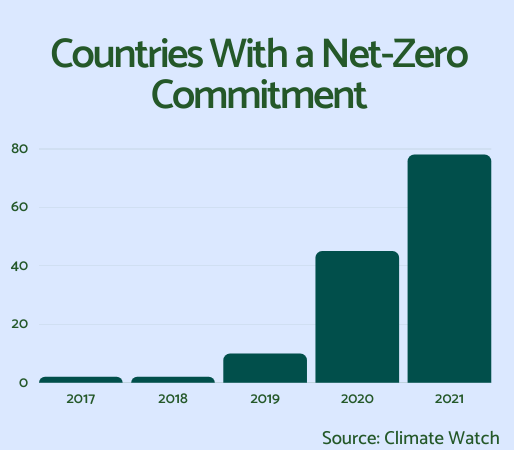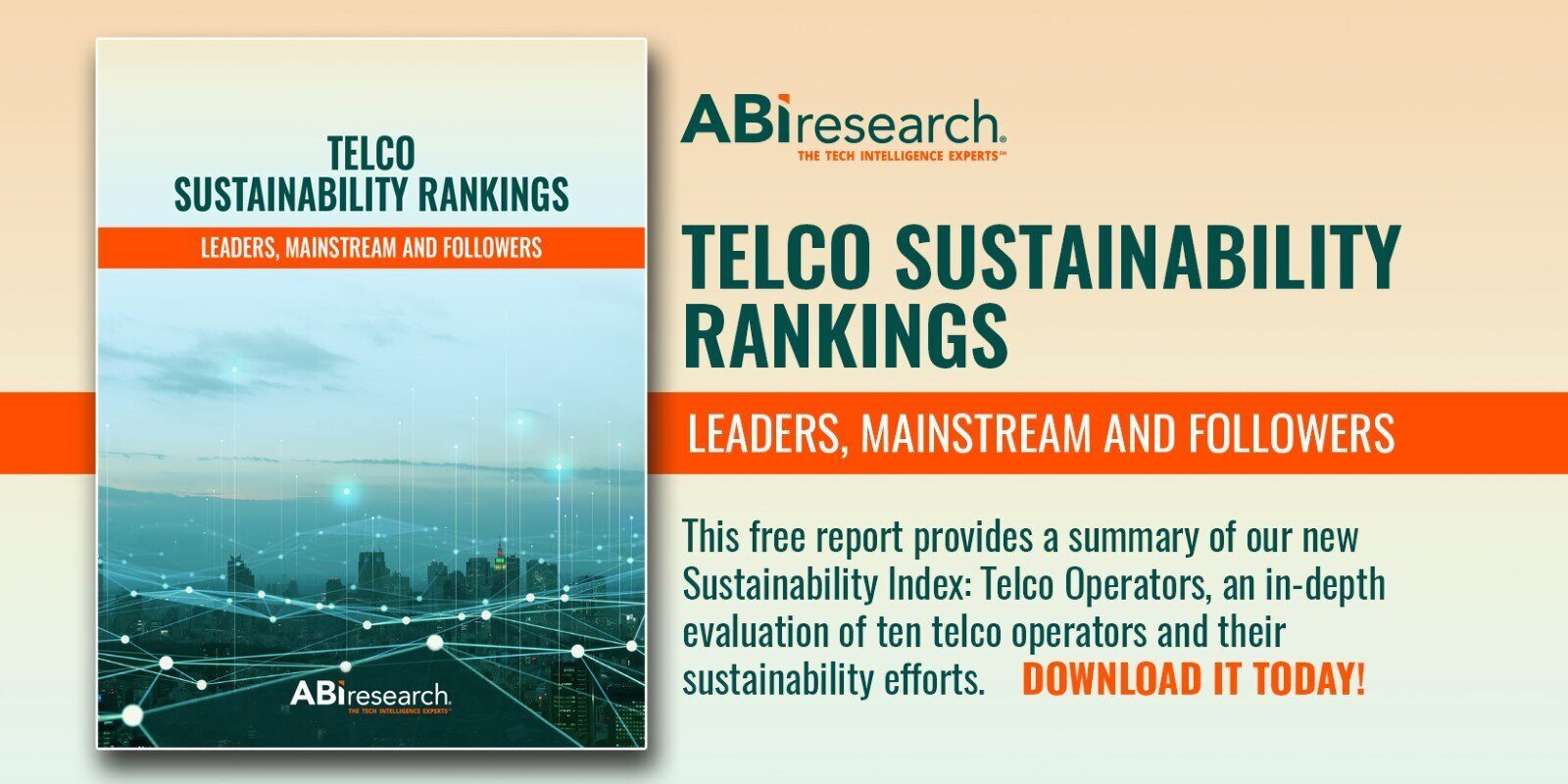Between government regulation and growing consumer interest in eco-friendly products and services, telecommunications (telco) operators have recently felt pressure to invest in sustainable energy solutions. Of all the Greenhouse Gases (GHGs) emitted worldwide, telco operators will be responsible for 2% of them by 2030—on par with the aviation industry, according to the Polytechnic University of Bucharest. Once completely off the radar for business leaders, sustainable technologies have gradually become a new staple in the telco industry.
ABI Research’s latest whitepaper, Telco Sustainability Rankings: Leaders, Mainstream & Followers, takes a closer look at how telco leaders are leveraging sustainable technologies to reduce their carbon footprint and promote positive branding.
A New Reality
In April 2021, the Global System for Mobile Communications (GSM) reported that mobile operators, which make up half of the global connections, are committed to science-based targets when it comes to executing sustainability. But the telco industry is not unique when it comes to adopting sustainable energy solutions. Just a few years ago, net-zero commitments across most industries were virtually unheard of, in a global sense. But today, 92 countries have made promises to achieve zero emissions.
Figure 1: Countries Committing to Zero-Emissions from 2017 to 2021 (Source: Climate Watch)

By investing in eco-friendly technologies, telco operators can:
- Cut down on costs
- Attract and retain talent
- Steer clear of regulatory risks
- Promote a positive brand reputation
- Create new sales opportunities through mission-aligned agendas
- Differentiate from competitors
- Acquire cheaper financing via Environmental, Social, and Governance (ESG)-backed capital
To successfully receive these benefits, operators must excel in six key areas: renewable energy, network upgrades, energy efficiency, waste disposal and circular economy, green buildings and vehicles, and reporting and governance.
Renewable Energy
Electricity and diesel consumption can be drastically reduced, or even completely replaced, by investing in renewable energy alternatives. Leaders in the renewable energy segment often sign Power Purchase Agreements (PPAs), obtain certificates, and use eco-friendly alternatives, such as biomass and solar panels.
One common theme found in our research on the top 10 market leaders in the telco sector is that operators in European markets have adopted sustainable technologies at a much quicker pace than the rest of the world—with four operators reaching 100% renewable energy in the region.
Network Upgrades
Telco operators are reducing their carbon footprint by replacing their legacy networks like 3G and 4G with newer iterations, such as 5G and Massive Multiple Input, Multiple Output technology. Along with that, copper is being phased out in favor of fiber. Tower equipment is also being upgraded to account for size, weight, and energy consumption.
Energy Efficiency
Sustainable operators leverage smart Artificial Intelligence (AI) technologies to automatically adjust power depletion levels based on network usage to cut down on energy consumption. Furthermore, success has been found through Single Radio Access Networks (SRANs), free-air cooling, liquid cooling, modernizing cell towers, and diesel power replacement.
Waste Disposal and Circular Economy
As operators accumulate waste, they look for new ways to keep their environmental impact as low as possible. ABI Research finds that effective initiatives include using eco-ratings, implementing a waste tracking program, pressuring suppliers to follow eco-friendly guidelines, recycling waste, and practicing sustainable water solutions.
Some companies find success in cutting down on GHG emissions by encouraging a circular economy—by re-using equipment, re-selling products, and using recycled eco-Subscriber Identity Modules (SIMs). In turn, this lessens the reliance on developing more potentially hazardous materials and offers affordable products for price-sensitive consumers.
Green Buildings and Vehicles
The hallmark of a green building is Leadership in Energy and Environmental Design (LEED) or similar eco-friendly certification. Green office buildings, data centers, and other infrastructure rely heavily on eco-friendly technologies. Market leaders like Telefónica partner with third-party firms to make the most of their resources. They upgrade Heating, Ventilation, and Air Conditioning (HVAC) systems, install motion sensors and modern lighting panels, and optimize water systems.
As a means of reducing the carbon footprint stemming from vehicle usage, telco operators are investing in electric and hybrid vehicles. For example, 98% of the vehicles Vodaphone purchased in 2020 were either electric or hybrid. Other companies like KPN further enhance their green initiatives through work-from-home policies (so employees do not drive to work).
Reporting and Governance
Financial backing for eco-friendly projects often comes in the form of green bonds. Green bonds usually have tax-related incentives, in addition to the mission-aligned nature of the investment. For transparency, telco market leaders make sustainability a core aspect of the company culture by publishing in-depth web content about their agendas and regularly communicating with stakeholders about Key Performance Indicator (KPI) targets.
ABI Research also finds that most sustainable operators pay close attention to their suppliers’ environmental sustainability and social efforts. We noted that top-ranking operators ensure that their suppliers are making efforts to reduce their carbon footprint and follow ethical labor guidelines for employees.
Prepare for These Telco Sustainability Trends
As consumers become more accustomed to green products and services, telco companies of all sizes must keep pace. Going forward, here are some trends to be mindful of:
- 5G offers huge leaps over 4G both in terms of connectivity and energy efficiency. But at the same time, the costs of implementing 5G are increasing.
- Operators set aggressive sustainability goals that will change the telco industry in a short time.
- Climate change is a major concern that companies aim to address.
- Operators will be expected to account for the carbon footprint originating not only from internal infrastructure but also from the supply chain and end-users.
- 100% renewable energy is beginning to become the industry norm.
- European markets are ahead of the world, but other regions are catching up as market conditions demand sustainable energy solutions.
The need for sustainable technologies is not going anywhere. It will only become more necessary for telco operators that hope to remain competitive.
To learn more about how operators are leveraging these sustainable technologies today, including how ABI Research ranked 10 market leaders, download our Telco Sustainability Rankings: Leaders, Mainstream & Followers whitepaper.





